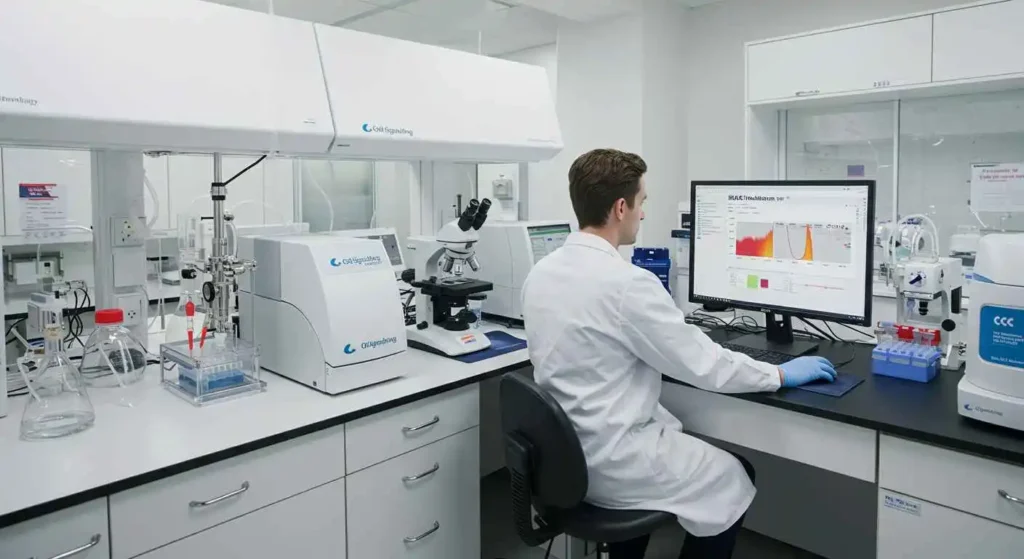You might think that Cell Signaling Technology KRAS, is a complicated scientific term that only doctors or researchers can understand. You don’t have to have a doctorate to understand it. This article will explain what Cell Signaling Technology KRAS is and why it is so important for cancer research. We’ll also show you how KRAS can help scientists study this.
What is KRAS?
KRAS acts as a small switch within your cells. It is a key component of cell signaling. This is how cells communicate to control growth and survival.
This switch can get stuck in “on” due to mutations. This causes cells to grow uncontrollably. We call this uncontrolled growth cancer.
Mutations of the KRAS genes have been linked to aggressive cancers, including:
-
Lung cancer
-
Pancreatic Cancer
-
Colorectal cancer
KRAS products are valuable because they allow scientists to study and detect KRAS mutations, as well as target them to develop new cancer treatments.
The importance of KRAS research: A quick anecdote
Sara, a friend of mine, shared with me a story once about her father, who was diagnosed as having pancreatic carcinoma. Doctors explained that this aggressive cancer was caused by a mutation. The scientific terms initially overwhelmed her family. When they discovered that researchers from around the globe are studying KRAS mutations with advanced technologies for cell signaling, they felt hopeful.
Cell Signaling Technology KRAS Antibodies and Kits offer us hope—tools to accelerate discoveries, fuel clinical trials, and bring personalized treatments closer.
What is cell signaling technology?
To better understand, let’s simplify. Imagine that your body is a city.
-
The cell is like a house.
-
The cell signals work like text messages to tell houses when it is time to turn on the lights, water the lawn, or repair the roof.
Imagine a house that ignores the rules, never shuts off its lights, uses excessive power, and drains water continuously. When KRAS mutations disrupt the harmony in the city, that’s what they do.
Cell Signaling Technology (CST) provides the scientific “detectives”—antibodies, reagents, and assays—that allow researchers to track these signals, measure them, and find ways to restore balance.
The cell signaling technology KRAS products: A step-by-step guide for scientists
Here’s a simplified step-by-step guide on how researchers use KRAS antibodies, kits, and cell signaling technology.
-
Sample Collection—Scientists collect tissue or cell samples (for example, from a tumor).
-
Use KRAS antibodies—Using KRAS-specific antibodies, they target the exact protein produced by the KRAS genes.
-
Visualize KRAS Activity–With techniques like Western blotting or immunohistochemistry, they can see whether KRAS is active or mutated.
-
Compare to Normal Cells—This helps scientists understand the contribution of KRAS in abnormal cell growth.
-
Test Drug Response—Researchers then test different drugs to see how KRAS-driven cells respond.
-
Share Results — The results are used to guide drug development and clinical trials.
The entire process could not be done without the high-quality antibodies and kits available from Cell Signaling Technology.
Why choose cell signaling technology KRAS products?
Why should I trust CST when there are so many biotech companies? Here’s why:
-
High Specificity and Reliability—Leading cancer researchers around the world trust CST products.
-
Peer-Reviewed Validation CST’s KRAS antibodies are cited widely in research papers.
-
Broad Application — From basic lab experiments to clinic studies, CST KRAS tools can be used for a variety of purposes.
-
Commitment to Science—CST invests heavily in research to ensure you get cutting-edge products.
Imagine you are building a home. Would you choose cheap bricks, which could crumble over time, or bricks of high quality that would last for decades? This is the difference between CST products and generic lab tools.
Cell Signaling Technologies KRAS Products
Here are some of the most popular categories for researchers to purchase:
-
KRAS Antibodies—Detect KRAS protein levels in cells.
-
Mutant-Specific KRAS Antibodies—Identify whether KRAS is cancer-causing.
-
Assay kits—complete kits to measure KRAS in one package.
-
Control Reagents—Help verify results for accuracy
Each of these products has a unique function in improving cancer research.
KRAS in Drug Development: The Bigger Picture
Companies are racing to create KRAS inhibitors, drugs that block KRAS mutations. CST’s tools have allowed researchers to pinpoint mutations and test therapies to bring real treatments to the patients.
The FDA approved Sotorasib for lung cancer patients. This proves that research on KRAS isn’t just theoretical; it saves lives.
How you can support the future of cancer research
When universities and labs purchase KRAS cell signaling technology products, they are not simply purchasing scientific equipment. The hope they invest in is for millions of patients with KRAS-driven tumors, including Sara’s father.
You’re choosing:
-
Supporting Innovative Science
-
Fueling new drug discoveries
-
Ensuring reliable, reproducible results
-
Contributing to lifesaving treatments
Conclusion: Invest Confidently in Cell Signaling Technology, KRAS
KRAS products give researchers the ability to unravel the mysteries surrounding one of the most significant cancer-related genes. These high-quality tools allow scientists to detect mutations, test treatments, and get closer to cures.

